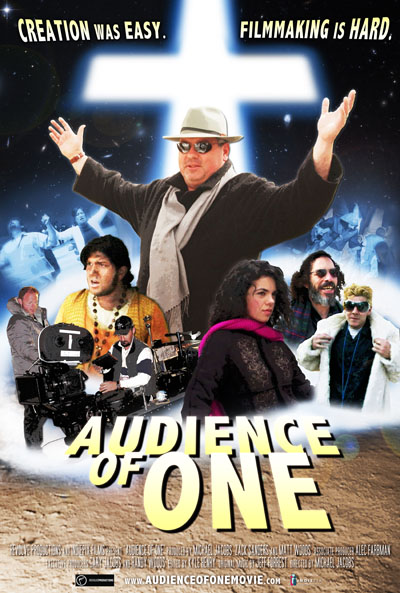'Audience of One'
 We've all had times when we knew, or thought we knew what we were doing was doomed to fail. And we kept going. Maybe we look back on these occasions as learning experiences, maybe they're embarrassing, maybe we ended up proving our pessimism wrong and actually won when it seemed that the likelihood of success was on a par with de Niro's hopes of getting to his island retirement at the end of 'Heat'.
We've all had times when we knew, or thought we knew what we were doing was doomed to fail. And we kept going. Maybe we look back on these occasions as learning experiences, maybe they're embarrassing, maybe we ended up proving our pessimism wrong and actually won when it seemed that the likelihood of success was on a par with de Niro's hopes of getting to his island retirement at the end of 'Heat'.
Saw a fascinating little documentary last night, with one of the most unusual premises: Pastor Richard Grasowsky, the protagonist of 'Audience of One' saw his first movie at 40 years old, believes he then received a vision from God telling him to make the greatest film ever made - magnificently described as 'Star Wars' meets 'The Ten Commandments' - and so he tried to make it. His church appears to be put to the service of the movie, they go to Italy to shoot some of it, they rent an enormous studio, they hire actors who don't appear to know how to act, they pray and dance, they raise some of the money, they get sued by the city council, they pray some more, they behave without guile, they complete two shots of the movie (which show up in the DVD's deleted scenes and aren't too bad at all), and the further adventures of Moses Skywalker remains unfinished.
What's surprising about this film is the tenderness with which it treats the people on screen - it has become fashionable lately to only make fun of religious believers, but while 'Audience of One' has a good share of Christians making us laugh, it never mocks. The production company that Pastor Grasowsky set up is called 'What You See is What You Get' - and the documentary's director Mike Jacobs has taken this to heart: the church members are never portrayed as anything other than sincere, kind, good people; misguided, of course, and perhaps not harmless, but no less so than any other ideologically-driven movement that undervalues reason. (In which category I include the New Atheists as well as fundamentalist religious believers; because both groups deny the evidence of alternative experience. Sorry. To readers who enjoy debating the merits of my religious adherence: I'm looking forward to discussing this movie with you.)
It's ultimately a sweet film, and the only one in which you're likely to hear an artist describe his vision for a particular film set as 'I want an ancient cappuccino shop/futuristic-ancient Starbucks deal'.
There's nothing like the passion that charismatic Christians can muster; but there may also be nothing like the apparent religious neurosis (that some might call arrogance) that takes over when people aren't able to subject their personal feelings to the 'Wesleyan Quadrilateral' (faith, tradition, reason and experience balanced against and with each other). 'Audience of One' doesn't look particularly deeply into the phenomenon of religious practices that allow Westerners to express their emotions in a manner reminiscent of fire-centered dances in National Geographic documentaries; but it raises the question: when we live in a world that tells us that the best thing a human being can do is to dream big dreams, what should we do when a friend's dream seems completely absurd?